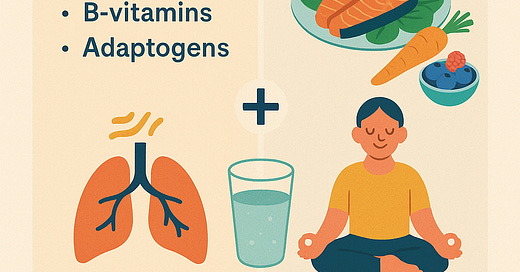Not long ago, I bought a bottle of nootropics that promised to make me the next Einstein—30 capsules for $149. I took them religiously for a month, waiting for brilliance to strike. What did I get? No flashes of genius. No quantum theories. Just the sinking feeling that I’d been scammed by a slick label and a dream of clarity.
And yes, I recently sat through an IV infusion—needles, amino acids, electrolytes—just so I could write about it. I wanted to know: do these things actually do anything? I needed to experience it, not just Google it.
So when two bright-eyed cybersecurity experts (we’ll call one of them DP) visited me last week to show off their new AI wellness app, they were thrilled to hear about Hopium Health. Until one of them said:
“You probably need some nootropics.”
I nearly dropped my ginger tea.
Nootropics: The Promise vs. The Placebo
Nootropics are marketed as cognitive enhancers—substances that supposedly help you focus better, think clearer, remember more, and power through your to-do list like a Zen robot. They come in capsules, powders, and even fancy gummy bear formats now.
But here’s the issue:
They’re unregulated by the FDA.
Clinical trials on most blends are non-existent.
Most contain standard stuff—caffeine, L-theanine, B-vitamins, adaptogens like Rhodiola, or amino acids like tyrosine and acetyl-L-carnitine.
You can buy the individual ingredients for pennies—and get more benefit from your fridge.
So what are you really paying for? Packaging. Hope. And maybe a tiny placebo bump.
I told DP and his co-founder: “If you have a great product, you’re a king. But if you have great distribution? You’re a god. Right now, you’ve got neither—just a product no better than a spinach salad.”
The Real Smart Drugs: Found in Your Fridge
Here’s a mind-blowing idea: what if everything you’re chasing in a nootropic capsule is already in your groceries?
Let’s paint this in full color and 3D. Real foods—unprocessed, vibrant, living—contain powerful compounds that directly impact brain function, energy, focus, memory, and even mood.
Breakfast Pharmacy
Eggs – Loaded with choline, which helps your brain make acetylcholine (a key memory neurotransmitter). Think of it as the brain’s WiFi booster.
Oats – Complex carbs release glucose slowly, fueling your brain without the crash.
Greek yogurt with chia seeds – Protein + omega-3s + probiotics = sustained energy + gut-brain harmony.
Brain-Powered Greens
Spinach – Iron, magnesium, folate = oxygen flow, energy metabolism, stress regulation.
Asparagus – Folate + inulin (a gut-loving fiber) supports mood, energy, and digestive function.
Brussels sprouts – High in vitamin K (for cognitive health), sulforaphane (brain detox), and fiber.
Midday Mastery
Salmon – Packed with DHA, a fat your brain loves. Improves memory, focus, and reduces brain fog.
Tofu/tempeh – Plant-based protein, rich in tyrosine—a precursor to dopamine (aka motivation juice).
Snacks with Smarts
Berries (blueberries, raspberries) – Polyphenols and anthocyanins that reduce brain inflammation and boost recall.
Citrus – Vitamin C fights oxidative stress in the brain, enhances alertness.
Pumpkin seeds – Zinc + magnesium + iron = better sleep, sharper focus.
The Legal High
Coffee (in moderation) – Caffeine + polyphenols improve focus and reduce reaction time. But stop by 12:30 PM, or you’ll pay the price at 3:00 AM.
Green tea – Caffeine + L-theanine = calm alertness without the jitters.
Guru Wisdom Beats Gummy Bears
Ancient teachers knew how to boost clarity without a capsule.
Yogananda taught that stillness and breath were the true keys to calm and focus:
“The mind is the king of the senses, but the breath is the king of the mind.”
Sadhguru reminds us:
“You are not your memory. You are not your imagination. You are the stillness between the two.”
So before you buy the next miracle brain pill, ask yourself: Have I hydrated? Breathed deeply? Slept? Eaten actual food with vitamins in it?
Because often, what we call “brain fog” is actually:
Dehydration
Poor sleep
Lack of protein
Too much sugar
Not enough stillness
“Before spending $149 on a nootropic stack, ask yourself what $1.50 worth of eggs, salmon, spinach, and berries can do. Your gut is the original biohacker.”
“The real nootropic stack: a walk, a nap, a glass of water, a bowl of lentils, and 5 deep breaths.”
“Sadhguru didn’t need pills. Yogananda didn’t need powder. They taught us to breathe—and it worked.”
Final Thought
If a nootropic label lists 27 ingredients and you can’t pronounce 24 of them, it’s not brain food—it’s branding.
Food is medicine. Breath is a prescription. Stillness is clarity.
At Hopium Health, we’re not anti-supplement—we’re anti-BS. So eat well, breathe deep, and save your $149 for something that actually feeds your brain. Like Brussels sprouts.
Hopium Health: We chew our nootropics, breathe our way to stillness, and question everything with a smile.















Eat real food, skip the brain pills.